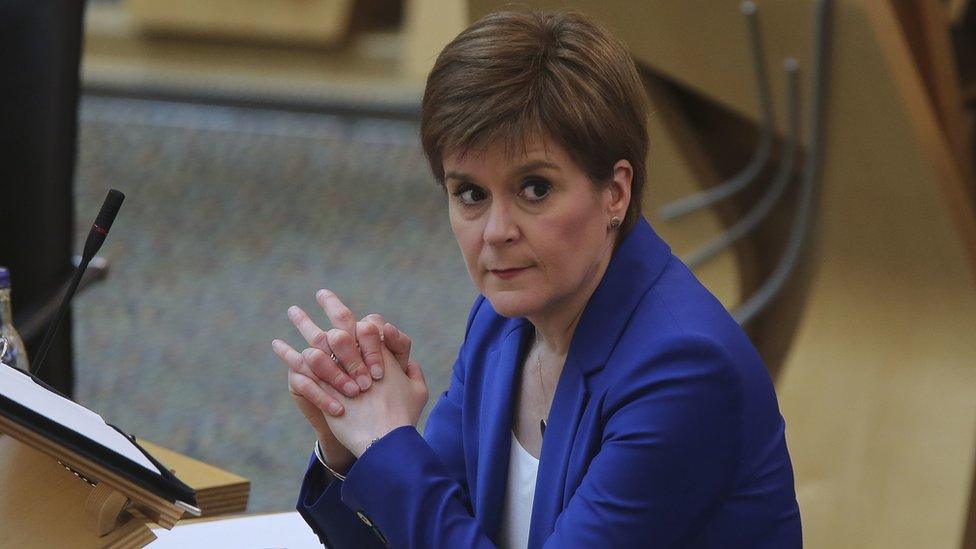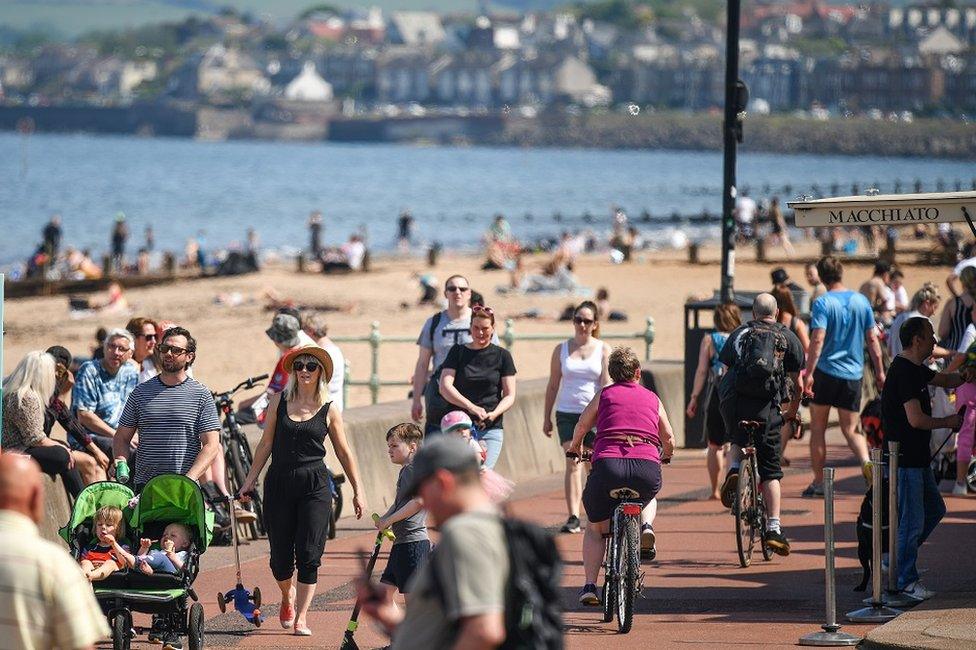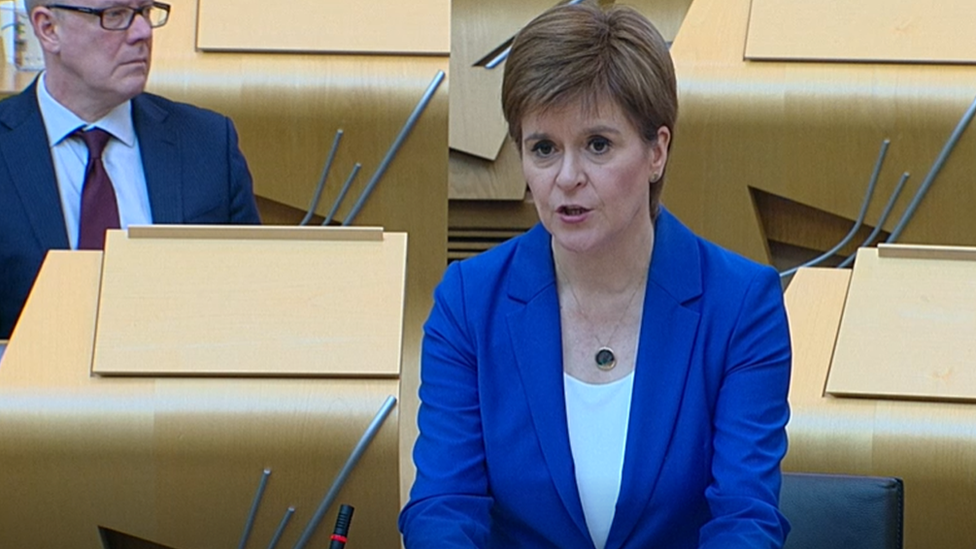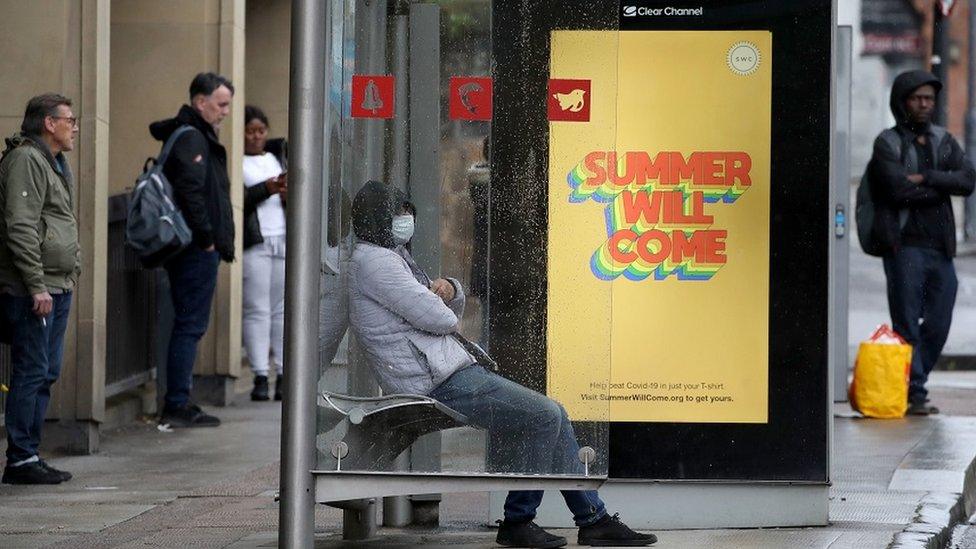Coronavirus: A route map out of crisis is revealed
- Published

Nature can provoke a range of emotions. On observing Portobello beach in Edinburgh, Nicola Sturgeon was, she told us, moved to tears.
Just what had prompted this outpouring of first ministerial emotion? Was it the riparian beauty of Scotland's eastern shores? Or the defiant courage of our citizenry, risking the possible flight of the sun and its attendant heat, ever hazardous in an early Scottish summer.
No, Ms Sturgeon was upset that so many seemed prepared to overturn the lockdown and strict social distancing in pursuit of a little solar warming.
She got the concept, she said. She understood the temptation. But she warned that proximity gatherings like this risked the further spread of coronavirus. If repeated, such manifestations risked jeopardising the progress made thus far.
It was that which brought her close to tears. The thought that all the effort - not her effort, you understand, but that of a compliant populace - could be at risk.
She pleaded with the public to stick to the lockdown rules - even as she outlined a route map by which those might be progressively eased. In future. Not, she emphasised, right now.
In some senses, this was a remarkably personal statement by the first minister. No surprise, really, given that she has placed herself indisputably at the head of Scotland's efforts to counter Covid-19, taking the prime public role.
She said that, if she had a fear right now, it was that people might begin to think that the crisis was over - that it was OK to meet up with chums and family, to gather, to work, to play. Without let or hindrance.
It absolutely was not. The prospect of a life-threatening second spike in the virus was only too real. It sounded, again, as if it haunted her personally.

Hundreds of people flocked to the beach in Edinburgh on what was the hottest day of the year in Scotland so far
Challenged over early testing of those admitted from hospital to Scotland's care homes, her response was again personal.
It was, she said, a responsibility she would bear with her for the rest of her life. The questions were legitimate, the issue tough. And there would undoubtedly be an examination of such matters in future.
But, she noted, hindsight was not available at the time decisions had to be taken.
In the early stages of this hideous plague, the focus had been on preventing the NHS from being overwhelmed by a tsunami of Covid cases. Ministers and experts were learning all the time.
There was even a brief susurration of humour to leaven this sombre statement. Referring to the prospect that hairdressers might eventually reopen, she speculated that this would be particularly welcomed by almost every woman in Scotland. And, she added wryly, some men.
Caution, caveat, balance
But mostly this was serious stuff. A cautious, phased easing of lockdown which would be monitored at all stages - and might have to be postponed or even reversed if the virus re-established its grip.
Mostly, parliamentary statements are attended by a degree of flamboyant stagecraft or even braggadocio. The minister will orate and challenge, slumping down exhausted at the close, all passion spent.
No such performance today. Not in these circumstances. Nicola Sturgeon was all too well aware that every word was being weighed - by her opponents, yes, but by the watching and listening public who craved information as to when their thwarted lives might return to something approaching normal.
When their kids might get back to school, when more shops might open, when businesses might reopen, when social gatherings might resume. Over a friendly drink, or tea and scandal, their ancient custom.
When mourners might be able to attend funerals, when social services might return to action. When transport might resume in a fashion approximating to the standard.
It was detailed today - with much, much more to come as the four phases arrive. She told us for example that golf, bowling, tennis and fishing will be able to restart because they are non-contact sports.
Those who enjoy such pursuits will, I feel certain, be pleased. The rest may be comforted by the thought that such activity is not mandatory.
But always caution. Always caveat. Always balance.
A return to contention
If credit is due to the FM for a diligent and dedicated presentation, then notice should also be paid to the opposition leaders.
At the very earliest phase of this virus, I was moved to note the degree of consensus in Holyrood, as if the questions and answers were choreographed. (To some extent, they were.)
Of late, there has been a return to contention. Opposition leaders have challenged and pursued the FM, most notably in First Minister's Questions yesterday when Jackson Carlaw, for example, depicted the Scottish government's strategy as failing.
But there was a change again today. This document was too detailed, too thorough, too significant to permit much in the way of all-out attack.
Instead, Ms Sturgeon's opponents mapped a careful route of their own. Blending pragmatic, detailed questions with advance warning that they were very far from abandoning the more fundamental challenges they had sought to pursue.
Mr Carlaw, for example, asked eminently sensible questions about the restoration of business - while also noting that he would require evidence of the readiness of the testing and tracing system.
Labour's Richard Leonard voiced support for the strategy while also demanding more detail on testing. Willie Rennie for the Liberal Democrats asked a series of pragmatic questions about the day to day handling of the strategy.
As did Alison Johnstone of the Greens, who added a sharp note to the effect that she regarded the Scottish plan with more favour than the "reckless approach" she believed was being taken in England.
Nicola Sturgeon paused for a fraction of a second - before stressing that she would resist the temptation to comment upon the actions of the UK government. It was not a day for party politics.
- Published21 May 2020

- Published9 July 2020

